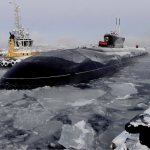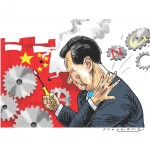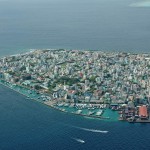- DETERRENCE: Only one Borei-class sub to join Russia’s Pacific Fleet this year — source
- DPRK: Kim Jong Un tours pesticide facility capable of producing biological weapons
- GOVERNANCE AND CIVIL SOCIETY: Draft law may test resilience of Chinese civil society
- CLIMATE CHANGE ADAPTATION: Port Vila Climate Vulnerability Assessment – Abridged Report (draft)
 DETERRENCE: Only one Borei-class sub to join Russia’s Pacific Fleet this year — source, TASS (28 April 2015)
DETERRENCE: Only one Borei-class sub to join Russia’s Pacific Fleet this year — source, TASS (28 April 2015)
One Russian Borei submarine with 16 Bulava SLBMs will deploy from Kamchatka in 2015; another in 2016. China will deploy Jin class submarines with JL-2 missiles able to hit the US and its allies. Like the Cold War, US-allied anti-submarine warfare will track Russian subs in bastions, open ocean, or Arctic; and Chinese subs outside homeport.
- China will deploy subs that could nuke Alaska or Hawaii this year, US Naval Institute News (5 February 2014)
- The tools of Owatatsumi: Japan’s ocean surveillance and defence, Desmond Ball and Richard Tanter, ANU Press. (2015) [PDF, 2.9MB ]
 DPRK: Kim Jong Un tours pesticide facility capable of producing biological weapons: a 38 North Special Report, Melissa Hanham, 38 North (9 July 2015)
DPRK: Kim Jong Un tours pesticide facility capable of producing biological weapons: a 38 North Special Report, Melissa Hanham, 38 North (9 July 2015)
North Korea reacted to a well-researched study that one of its pesticide factories can be used to manufacture biological and or chemical weapons; however North Korea has yet to react to the new U.S. National Military strategy. North Korea can’t win any strategic offensive – even one it may start – so it must resort to extreme defensive tactics; intimating a biological capability and demonstrating the ability to acquire equipment banned by numerous international sanctions is just this sort of defensive tactic. While the Iran and North Korea nuclear problems are vastly different, the U.S. administration should have a bit more bandwidth to focus on North Korea once the Iran agreement has been accepted by all relevant parties.
- North Korea denies anthrax production, invites Obama to verify, Elizabeth Shim, UPI (13 July 2015)
- Technical Bulletin #59 on prohibition of dual use exports to North Korea, Roger Cavazos, Peter Hayes and David von Hippel, NAPSNet Special Reports (26 September 2013)
- Experts: Iran Deal has Limited Impact on North Korea, Sungwon Baik, Voice of America (15 July 2015)
 GOVERNANCE AND CIVIL SOCIETY: Draft law may test resilience of Chinese civil society, Carolyn Hsu, East Asia Forum (2 July 2015)
GOVERNANCE AND CIVIL SOCIETY: Draft law may test resilience of Chinese civil society, Carolyn Hsu, East Asia Forum (2 July 2015)
NGOs in China are expecting tighter controls and stronger clampdowns as the government considers the Overseas NGO Management Law. While NGOs have long been subject to interference, the law would appear to legalize what before were arguably illegal methods. China is also clamping down on non-NGO activists, with the arrests over the past week of numerous human rights lawyers and activists nationwide.
- China asserts more control over foreign and domestic NGOs, Stanley Lubman, Wall Street Journal (16 June 2015)
- Scores of rights lawyers arrested after nationwide swoop in China, Ivan Watson and Steven Jiang, CNN (14 July 2015)
 CLIMATE CHANGE ADAPTATION: Port Vila Climate Vulnerability Assessment – Abridged Report (draft), Alexei Trundle and Darryn McEvoy, UN Habitat for a Better Urban Future and Climate Change Adaptation Programme of Global Cities Institute, RMIT University (January 2015) [1.45 MB, PDF]
CLIMATE CHANGE ADAPTATION: Port Vila Climate Vulnerability Assessment – Abridged Report (draft), Alexei Trundle and Darryn McEvoy, UN Habitat for a Better Urban Future and Climate Change Adaptation Programme of Global Cities Institute, RMIT University (January 2015) [1.45 MB, PDF]
Small Island Developing States (SIDS) such as Vanuatu are at the forefront of climate change, disproportionately exposed to hazards such as sea level rise; coupled with both heightened sensitivity to and reduced adaptive capacity for dealing with climate hazards. This means that SIDS are not only amongst the nation states most at risk from projected future climate changes, they are also some of the most vulnerable to current climatic extremes and the early impacts of rising global temperatures.
- Vulnerability and adaptation to climate change in small island developing states, Graham Sem, United Nations Framework Convention on Climate Change-UNFCC (2007) [445 KB, PDF]
- Small Island developing states: natural disaster vulnerability and global change, Mark Pellinga and Juha I. Uitto, Environmental Hazards, vol. 3, pp. 49–62 (2001) [196 KB, PDF]
The Nautilus Peace and Security Weekly Report presents articles and full length reports each week in six categories: Austral security, nuclear deterrence, energy security, climate change and security, the DPRK, climate change adaptation and governance and civil society. Our team of contributors carefully select items that highlight the links between these themes and the three regions in which our offices are found—North America, Northeast Asia, and the Austral-Asia region.
- Subscribe to NAPSNet to receive free weekly email reports.
- Editor: Arabella Imhoff
Contributors:
- Deterrence: Peter Hayes
- DPRK: Roger Cavazos
- Governance and Civil Society: Dyana Mardon
- Climate Change Adapation: Saleem Janjua

